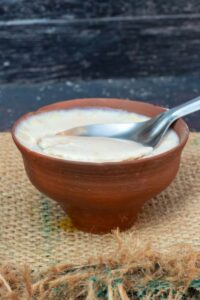Lactose intolerance affects millions of people worldwide, making it essential to understand how different dairy products, such as curd (yogurt), impact individuals with lactose sensitivity. Curd, with its probiotic benefits and unique fermentation process, often raises questions about its suitability for those with lactose intolerance. In this blog, we delve into the relationship between lactose intolerance and curd, exploring whether curd is a safe option for individuals with lactose sensitivity.

Understanding Lactose Intolerance:
Lactose intolerance occurs when the body lacks sufficient lactase, an enzyme needed to break down lactose, the natural sugar found in milk and dairy products. Without enough lactase, lactose remains undigested in the intestines, leading to symptoms such as bloating, gas, abdominal pain, and diarrhea in individuals with lactose intolerance.
The Role of Curd:
Curd, also known as yogurt, undergoes a fermentation process where live bacteria cultures, including Lactobacillus bulgaricus and Streptococcus thermophilus, are added to milk. During fermentation, these beneficial bacteria convert lactose into lactic acid, reducing the lactose content of curd. As a result, many individuals with lactose intolerance find that they can tolerate curd better than other dairy products.
Factors to Consider:
While curd may be more easily tolerated by individuals with lactose intolerance, several factors can influence its suitability:

- Fermentation Process: The longer curd is fermented, the more lactose is converted into lactic acid. Opting for well-fermented curd may further reduce lactose content and improve tolerance for some individuals.
- Probiotic Benefits: Curd contains beneficial probiotic bacteria that support gut health. These bacteria may aid in lactose digestion and improve symptoms of lactose intolerance in some individuals.
- Individual Tolerance: The degree of lactose intolerance varies among individuals. While some may tolerate curd well, others may still experience symptoms. It’s essential for individuals to listen to their bodies and determine their tolerance level to curd.
Choosing the Right Curd:
For individuals with lactose sensitivity, there are several options to consider:
- Regular Curd: Many individuals with mild lactose intolerance find that they can tolerate regular curd well, especially if it is well-fermented.
- Lactose-Free Curd: Lactose-free or low-lactose varieties of curd are available in the market. These products are made using lactase enzyme, which breaks down lactose, making them suitable options for those with lactose sensitivity.
Conclusion:
Curd can be a safe and nutritious option for individuals with lactose intolerance, thanks to its lower lactose content and beneficial bacteria. However, tolerance levels may vary among individuals, and it’s essential to choose lactose-free or low-lactose options if needed. As always, consulting with a healthcare provider or dietitian can provide personalized guidance and recommendations based on individual health needs and preferences.




